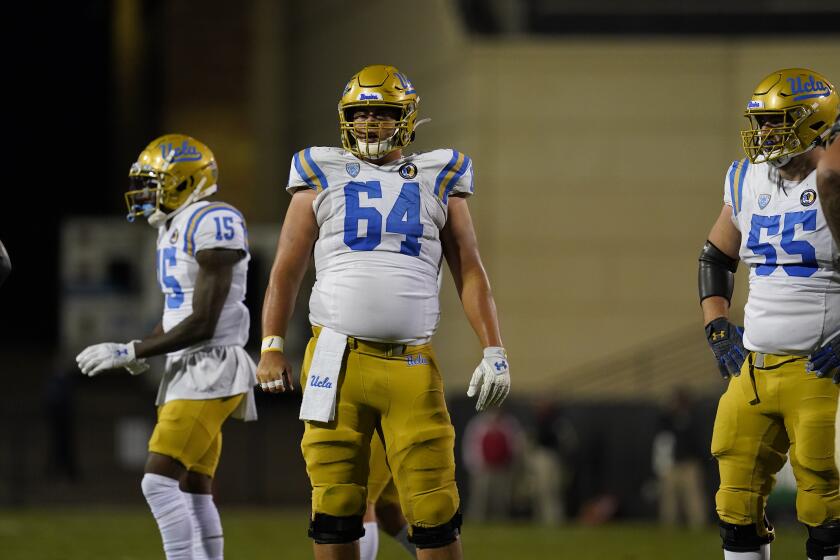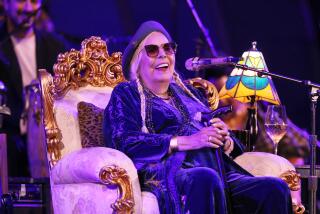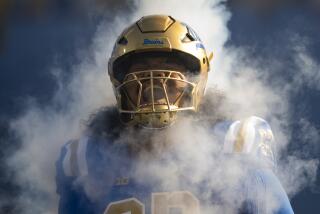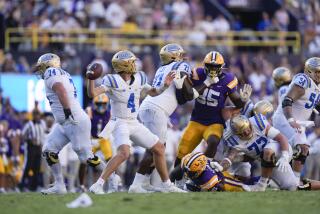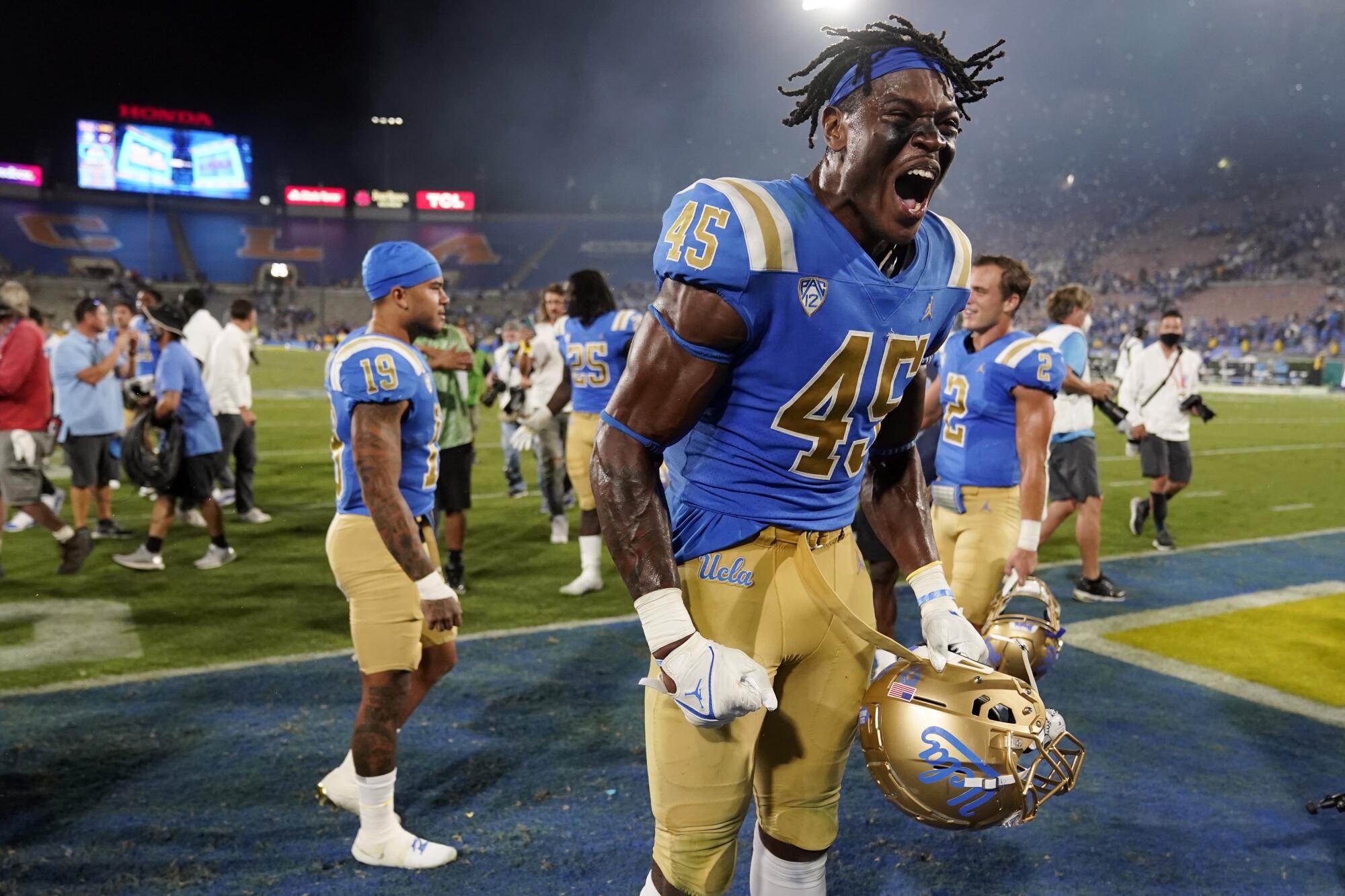
On the practice field, as he lines up across from the quarterback, he’s surging into the backfield.
In the weight room, as he strains against the stack of iron, he’s eluding an offensive tackle.
As he walks onto the field on game day, he’s wearing an NFL jersey.
Before he does something, Mitchell Agude always visualizes it. It’s a skill the UCLA edge rusher’s mother, Grace, taught him to help get the things he wants, no matter how improbable they may seem. If you can imagine it, she would say, you can do it.
Over the years, there has been one thing the Bruins’ most disruptive defender has pictured that he would rather not. It’s his life ending in a RipStik accident when he was 9.
“Every day at practice, every day during games, I’m just thinking I might not be here, I could be just dead,” said Agude, who has no memory of the traumatic brain injury that nearly killed him. “I damn near get in tears every game just because I know there’s a reason I’m here.”
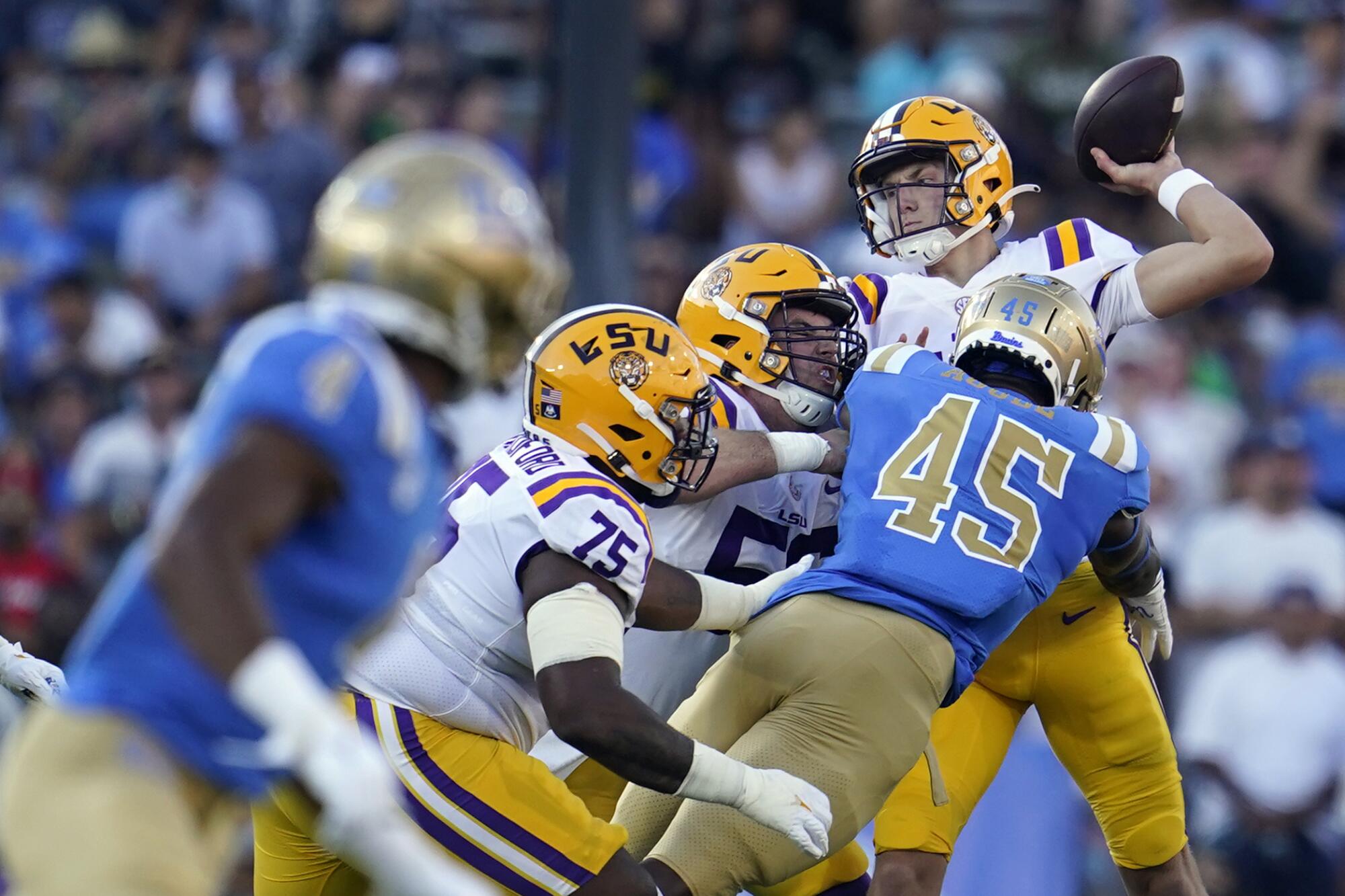
Agude said he believes he was spared from a premature demise to help his family, the cousins and their parents living in poverty back in Nigeria. He saw the merciless conditions while accompanying his mother on trips to her homeland to deliver medicine and supplies as part of her nonprofit foundation.
It’s a vision that has driven him to go from a virtual unknown at Corona Santiago High to rising star at Riverside City College to senior playmaker at UCLA. Agude’s four forced fumbles this season give him 1.33 per game, most in the nation.
The player who calls himself “The Diamond in the Dirt” is no longer an anonymous find, nudging himself into NFL draft consideration with his relentless effort. Bruins coach Chip Kelly compared Agude to Charles Tillman, the former Chicago Bears defensive back who once forced a league-record four fumbles in one game.
If there’s a chart to climb, a record to break, Agude doesn’t intend to stop until he reaches the top. It’s a family tradition that began with another of his mother’s mantras.
“I tell them, ‘If you are best, if there is somebody in front of you, then you have not given your best,’ ” Grace Agude said. “ ‘Your best has to be the best of all bests and you are not in competition with anybody but yourself. ’ ”
::
The only thing Mitchell remembers is the slight push over the edge of the skateboard ramp.
That, and what he was wearing.
Like the other kids at Corona’s Santana Park, Mitchell shunned a helmet in favor of a snapback hat. It looked cool but provided no protection when he fell off his RipStik and slammed the back of his head into a slab of concrete.
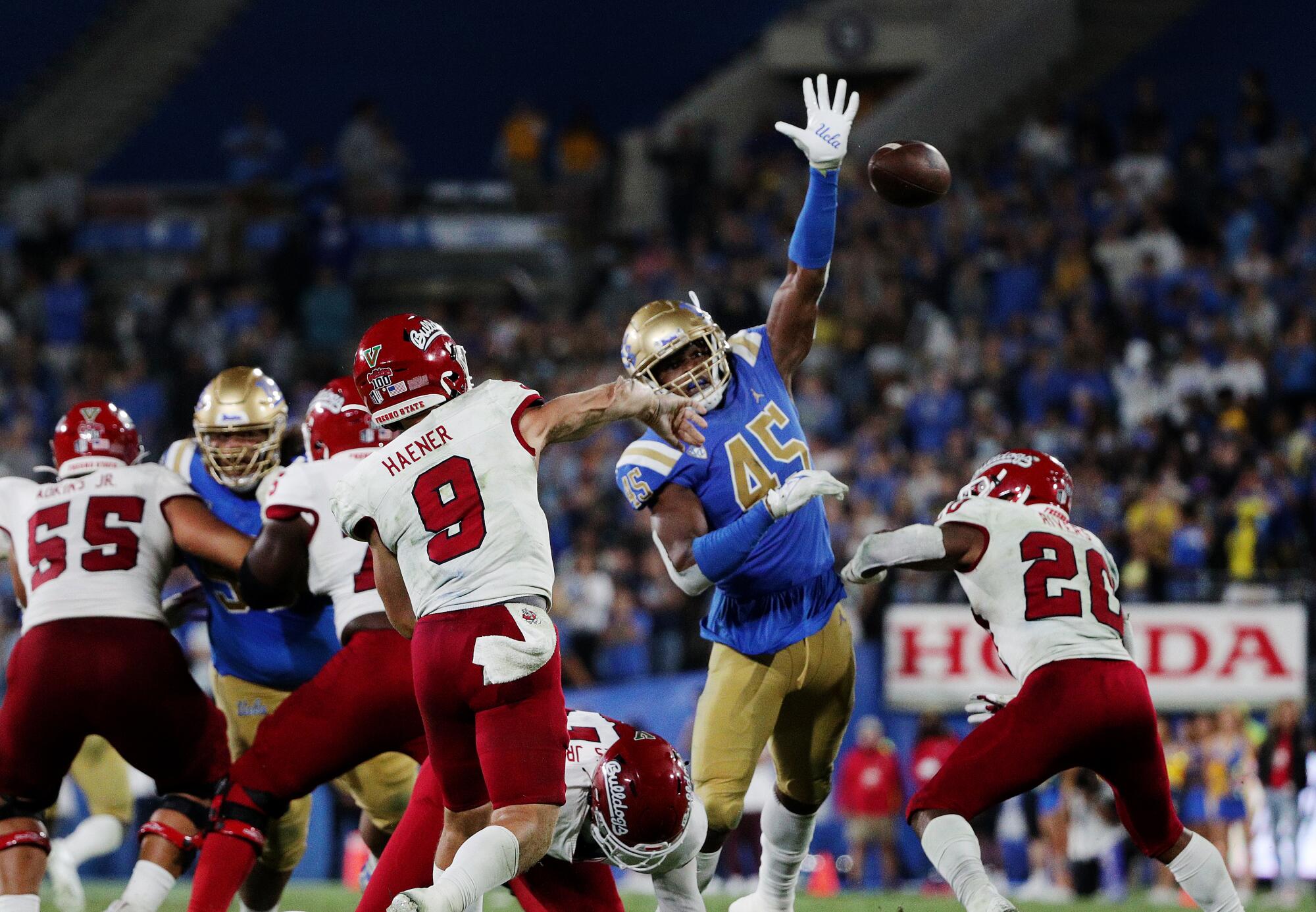
By the time his mother reached his bedside at Loma Linda University Medical Center, Mitchell was in a coma. Doctors wrapped his unconscious body in warming blankets as his temperature plummeted.
“They covered him like someone who was going to the moon,” said Grace, an intensive care nurse who instantly recognized the treatment protocol.
She was told her son was never going to be the same, that he would spend the rest of his life in a vegetative state. Doctors made an incision in Mitchell’s skull, but they didn’t know whether it would sufficiently relieve the swelling in his brain.
“I went to the bathroom and I kept on praying — I kept on praying! — and my faith is what got me through this,” Grace said, her voice rising with emotion. “I refused to accept what I was seeing.”
Her faith was buttressed by Mitchell’s middle name, Chukwuebuka. It means “God is great” in her native language.
Early the next morning, after the family pastor had arrived, Mitchell awoke with a frenzy, ripping the medical wires off his body. A few hours later, he responded to commands that gauged his cognitive function. His breathing tube was removed.
“I tell them, ‘If you are best, if there is somebody in front of you, then you have not given your best. Your best has to be the best of all bests and you are not in competition with anybody but yourself. ’”
— Grace Agude said, recalling advice she gave to her son, UCLA linebacker Mitchell Agude
Lab work was remarkably normal. An MRI exam showed the swelling had subsided. Doctors said the boy could go home.
Only a few days after entering the hospital on the verge of death, or at least a life permanently altered, Mitchell exited under his own power, not even requiring the courtesy wheelchair.
“I’m sorry,” Grace said, her voice catching as she recounted the scene. “Inasmuch as it’s been many years, I don’t like to recall it. This is a miracle child. I wake up never believing this child is going to be alive today to do what he’s doing.”
::
Doctors sent Mitchell home with one caveat: no contact sports for five years.
Grace got the message. Mitchell wanted to continue being a 9-year-old, so he snuck out to play football or soccer whenever he could, telling his mother he was headed to go study or using some other ruse.
“Sometimes I would be able to play, sometimes she would find me, somehow, and I would get yelled at,” Mitchell recalled with a laugh. “But it was always worth it because I was a little kid, so I want to have fun.”
Mitchell especially enjoyed playing backyard cornerback against his older brother Nnamdi, a wide receiver who went on to play for Sacramento State and later professionally overseas. His brother’s success made Mitchell begin to take his academic career seriously after coasting for years.
Realizing how much her youngest son loved the game, Grace granted a special birthday wish before he finished middle school, telling him he could play organized football. He went on to make the varsity team at Santiago before becoming a coveted junior college prospect who committed to Maryland.
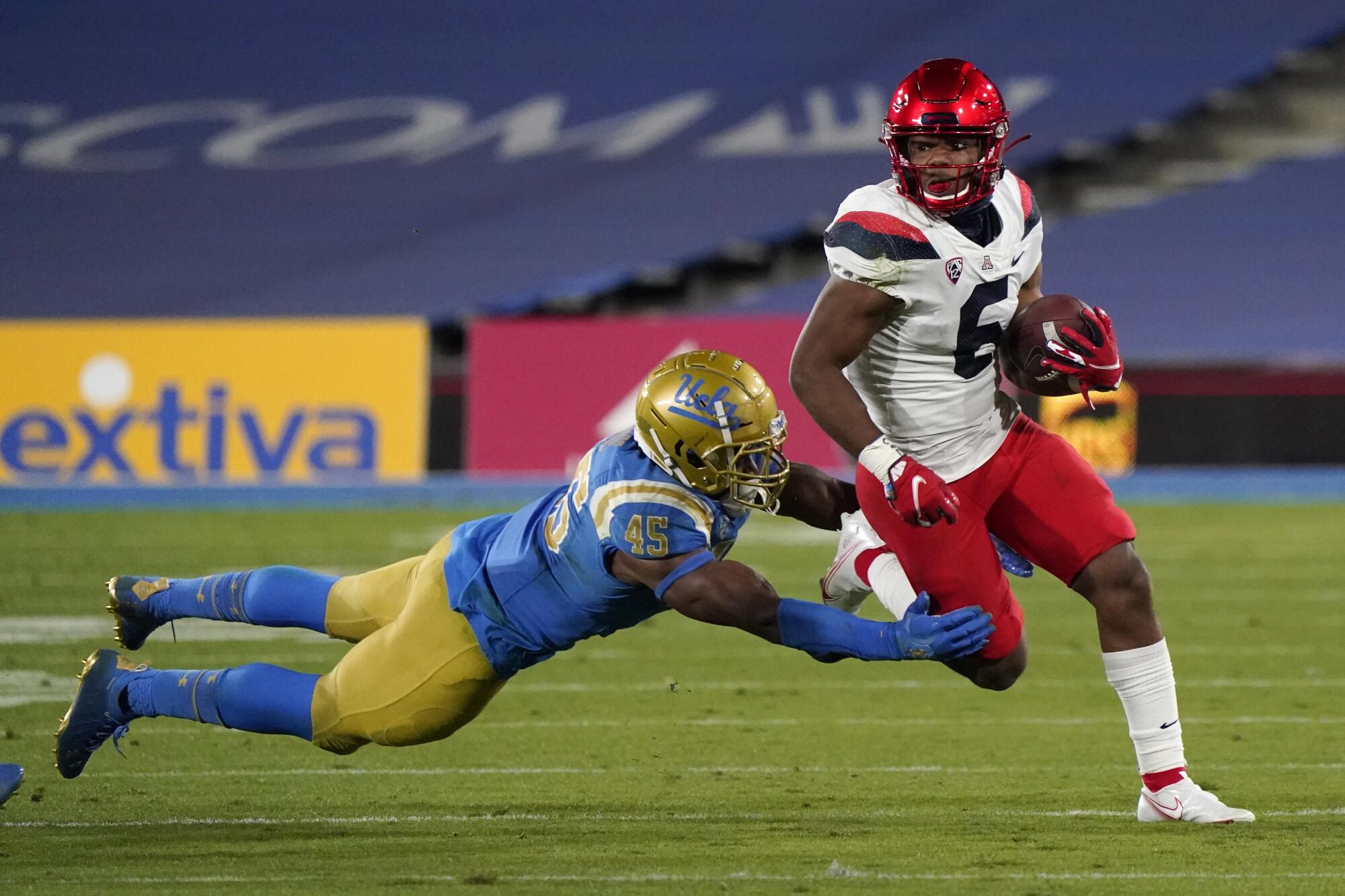
But the Terrapins told Mitchell his grades weren’t good enough to enroll, sending him into a funk for two weeks. His spirits lifted when his academic advisor received an email from Ethan Young, UCLA’s director of player personnel, saying he had a chance to become a Bruin if he completed enough coursework with all A’s and B’s.
Mitchell printed out the email and stuck it on his wall, envisioning his future once more. He took seven classes at community colleges in Riverside and Norco in addition to online. He earned the grades he needed.
“I just said, ‘I’m going to do this,’ ” Mitchell said, “and I went out and did it.”
Having long joked about going to UCLA because it was his dream school, the fantasy was fulfilled. His impact was immediate, the 6-foot-4, 245-pound newcomer leading the team with nine tackles for loss and forcing three fumbles during a shortened 2020 season.
Strength, quickness and nonstop pursuit of the ball are among the qualities that have made him one of the nation’s best at forcing fumbles. A video of Mitchell evading a Louisiana State offensive lineman with a Euro step and swiping his hands away as he gets past the blocker to knock the ball out of quarterback Max Johnson’s hand was recently circulated by a Twitter account featuring top plays by defensive linemen.
“Have a plan,” the caption read, “& beat the hands!”
::
Plans don’t always work out, of course.
Mitchell’s father, Sunday, emigrated from Nigeria to the United States with hopes of becoming a doctor. Unable to complete a residency because he didn’t possess a green card, Sunday pivoted to chemistry and now works as an engineering technician for the California Department of Transportation.
Grace works at Kaiser Permanente and runs Grace Mission International, a nonprofit that supplies medicine and pays for medical treatments in her homeland. Since 2006, she has returned once a year to Obe, a rural area in the Nkanu West Local Government Area of Enugu State in southeastern Nigeria, to oversee the operation.
No. 24 UCLA is pushing to bounce back from a sobering last-minute home loss to Fresno State when the Bruins visit Stanford.
“Many people are suffering, especially in the healthcare system,” Grace said. “The poverty rate and the healthcare system where I come from is not something to write home about, so I decided early on when I started my business to start giving back.”
While accompanying his mother on four of her trips abroad, Mitchell experienced an epiphany. He needed to pursue his football dreams so that he could support his extended family.
Part of his plan is to open a Six Flags-style amusement park and name it “Good Days,” a playful spin on his last name.
“I’m going to make sure all my cousins have jobs and everyone’s fed, everyone’s good,” Mitchell said. “That’s my life goal, to make sure everyone’s straight, and that’s what’s going to happen.”
He’s sure of it, having already seen it.
More to Read
Go beyond the scoreboard
Get the latest on L.A.'s teams in the daily Sports Report newsletter.
You may occasionally receive promotional content from the Los Angeles Times.

